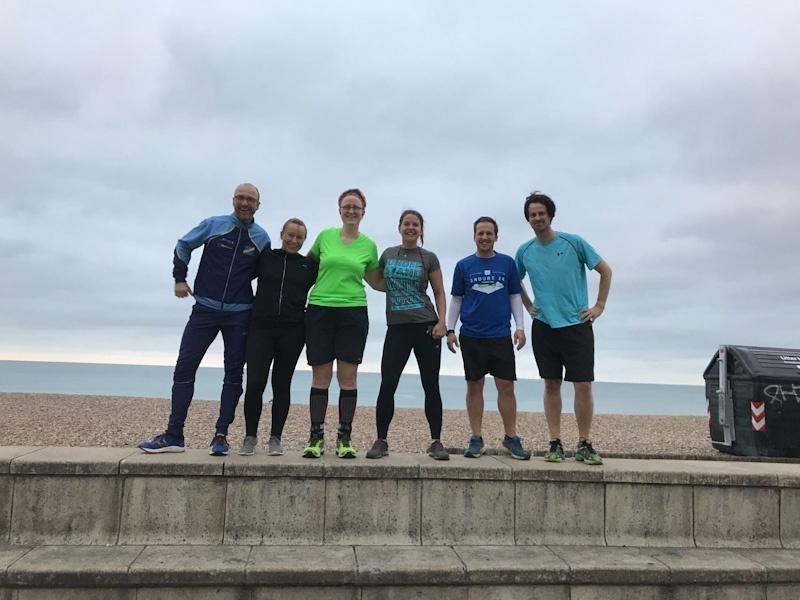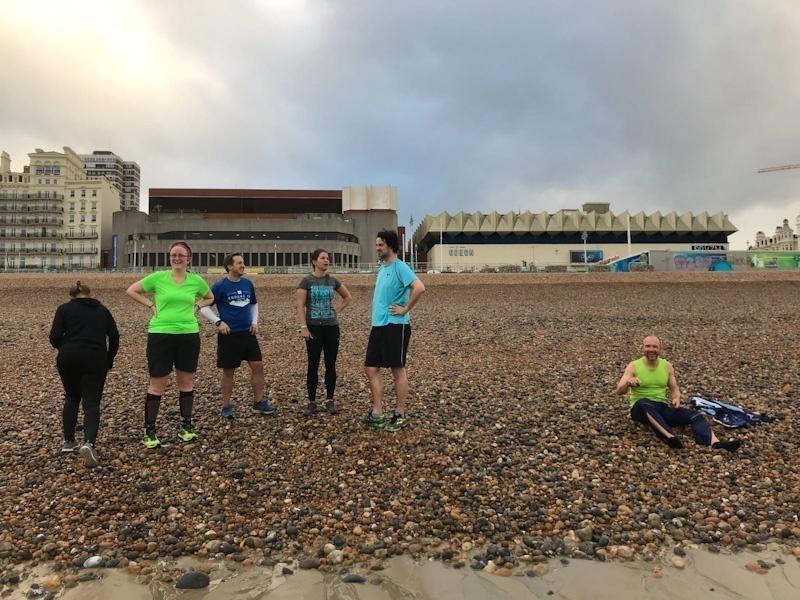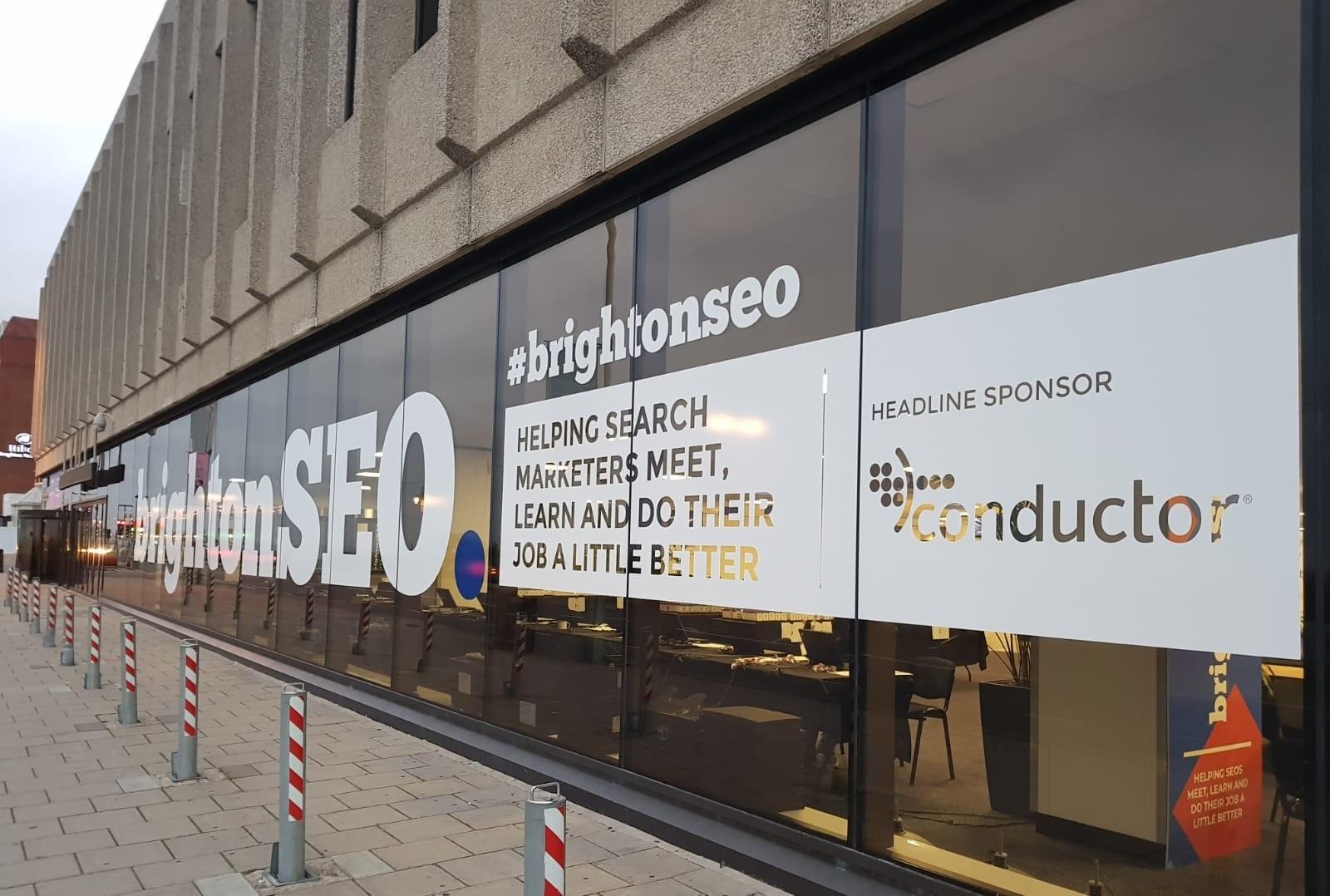I've been attending for the past three years. Without fail I have come away from every conference with ideas, enthusiasm and often with the need to decompress my brain!
The latest installment was no different!
#RunBrightonSEO
Arriving the night before, I was able to join the intrepid band of amphibious folk for #RunBrightonSEO ... a 5k run starting at 7am sharp. Claire prepared a great route along the Brighton sea front, complete with photo reference points!
We all set off at our own pace (I'm most definitely a tortoise rather than a hare!) and we met on the shoreline back at the start where several people went for a swim. Big thanks to Claire for organising it, a great way to get to know a few people in a rather different way!


After a quick shower and checking out of the hotel, it was over to The Brighton Centre to register and chat with sponsors. It's great to talk to the people who build the industry gold standard tools.
Discussing with representatives (and picking up some free trials and swag!) is a huge time-saver when you are researching tools and services. Often you don't know what you don't know - things change so fast in this industry, so it's important to keep an eye on new developments.
Content strategy sessions
As much of my focus involves communication and content strategy, I headed to the main auditorium for the content stream. Ross Tavendale kicked us off with a great talk on Data Journalism, which included some really handy top tips for winning big links with techniques including data mining of public data sources (useful link: https://toolbox.google.com/datasetsearch). He walked us through an example of a client who had a £50k budget per month, and how his team went about developing their content strategy. Some useful tips I took away were the use of a RAP sheet (Research, Angles, Pitches) to quickly develop multiple potential ways to approach a piece of content.
More in the slide deck here:
The next talk from Sarah Bradley explored how to engage with millenials on social media, and challenged some preconceived ideas we might have about them.
Finally closing the first session was an interesting venture into how to use live video in content marketing. It's something we've been exploring at Cambridge Assessment English on both Facebook and Instagram, so I was interested to hear how others are planning and executing their campaigns using live video. Some useful tips on preparation, how to drive engagement, and not giving up if it doesn't pick up at first!
More content sessions
The next session I attended by Matt Sitala entitled 'Are you a content creator, or a content documentor' gave some really helpful suggestions for how you can create a 'visual snack pack' of resources from one infographic that enables you to repurpose your content in multiple ways, across multiple channels. I'll certainly be taking some of this on board.
Next up, John Brasington gave an insightful talk entitled 'Contextual optimisation: How to create value-led content for your ecosystem'. My key takeaway points from this session were around the importance of thinking about how your content relates to existing content in your 'ecosystem', and making sure that you address any conflicting content before you hit publish.
Keynote time!
After a short break where I caught up with a colleague who had been in Brighton for the training course the day before, I headed to the keynote by Meg Fenn - Using stunning design to leverage your SEO.
It echoed a lot of what I have learned over the years from experts like Chiara Aliotta at Until Sunday - the importance and cross-over of design when it comes to the user experience, and how this impacts on your SEO. Meg covered a range of topics and shared some great tips, so make sure you check out the talk!
Getting geeky with Javascript SEO!
Having inherited a React front-end / WordPress back-end (yes, you read that right!) website at work, and knowing the buzz on the 'wires' about the importance of Javascript SEO now there are many more sites being deployed using JS, I headed over to the sessions on this topic. Hands down, the most informative sessions of the day (in my humble opinion!).
Martin Splitt gave a great overview into how Javascript sites actually work 'under the hood' and the different problems that can be encountered. He walked us through the different options - client-side rendering (CSR); Server-side rendering (SSR); and Hybrid rendering. We learned the challenges Google is trying to overcome when it indexed Javascript sites and why things sometimes go wrong, resulting in indexing problems. Martin declared publicly that developers documentation on dynamic rendering would be going live the following week - and he was true to his word! Martin fielded a lot of questions, some of which were relevant to the issues I've been working with, so it was super helpful to hear how he recommended addressing them. I was fortunate to catch up with Martin after the session to dig into some of our issues with the React site and really appreciated his input!
Next up, Jamie Alberico gave a great session on Angular SEO, and addressed some of the challenges faced. A couple of the tips mentioned will be really interesting to explore going forward, including the use of puppeteer/rendertron.
Back to content again!
The next session from Björn Beth & Svetlana Stankovic - Making Data Dreams come true: Bridging the Gap between Ranking Factors and SEO Strategy - had some great insights into the importance of considering content as an agile structure, comprising of five stages: analyse, develop, create, update, and monitor. This mirrors what I am developing in my content strategy so it was helpful to hear how this works at a larger scale. The talk also covered the importance of balancing fresh news with archives of previous news - category and tag filtered pages, for example - which can sometimes rank much higher than fresh content.
Next up, a fascinating insight into the changes in the latest Quality Raters' Guidelines from Google by Marie Haynes. Having previously worked as a quality rater many years ago, I was interested to hear how the guidelines had been developed over the years. Certainly it pays to keep an eye on this document, as it gives us an insight into what the search algorithms are trying to use as indicators of good (and bad) quality content. A key takeaway for me was the increasing importance of being able to clearly see information about the author of content, enabling the reviewer to determine their authority on a subject. This sounds very much like how the old Authorship system used to work with Google+, but in a much more subjective way. Another important takeaway was that sites which bombard the user with pushy sales tactics - particularly in a 'Your Money Or Your Life' (YMYL) context - will be penalised. Marie shared some examples of this in action which were rather sobering! Closing statement: Make a website that people trust and recognise as an authority.
The penultimate session was an intense walk-through of ranking factors in YouTube and how to optimie as part of your marketing strategy. Luke Sherran gave us some great tips on what the 'real stats' were, and what they actually meant. Some important takeaway points included making sure you launch at the right time - the aim being to get the most views in the immediate minutes and hours after release - and ensuring you optimise vital elements such as the title and thumbnail.
Rand Fishkin keynote
Finally, a great ending to a full day was the keynote by Rand Fishkin. Technical issues aside, Rand gave some great insights into where he sees the future of search and most importantly, what this means for us as search marketers. My key takeaways included the importance of building your own websites and email lists on your own real estate and not relying on external sources such a social networks or search engines which can change the 'rules' without notice. Also, the importance of leveraging every scrap of organic traffic that arrives on our site. Make it convert, don't waste it! Rand also emphasised the importance of building up demand for your content and tools, and controlling closely how your brand appears in search results. SEO will be a crucial skillset for at least another decade, probably longer says Rand. Phew, that's a relief then! :)
All in all, another awesome BrightonSEO, I hope to return again in the spring!







